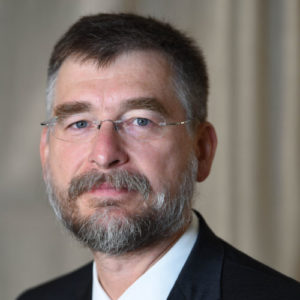Foundations of Grand Strategy
Assess grand strategic theory and practice in Thucydides and Plutarch.
July 29 – August 4, 2018
WASHINGTON, DC
Classic strategic thinking, in the Western tradition, is not about rigid doctrines – realism, liberal internationalism, etc. – and the debates between them. Instead, it encourages statesmen to clarify larger principles and aims for their state about war, peace, and justice; and to develop the judgment to pursue those principles in the dynamic and confusing circumstances of a particular time and place.
This seminar will investigate the causes of war and peace, and some of the strategies that states and leaders have pursued to contend with armed conflict and promote international order, stability, and justice. It will consist of two sessions per day over a one-week period. Each morning, students will discuss readings by two great theorists of strategy – Thucydides and Machiavelli – and then classic American statements, all with a view toward asking how a liberal democracy should conceive of grand strategy and the kind of strategic thinking that statesmen in liberal democracies must undertake to serve both interests and ideals. Each afternoon, students will participate in a seminar led by an expert or policymaker to help probe the relevance of the seminar’s broad themes to the challenges that America faces today. Past guest lecturers have included Elliott Abrams (Council on Foreign Relations), Walter Russell Mead (The American Interest), and Paul Wolfowitz (AEI), among others.
Paul Carrese on American grand strategy
This one-week course will take place in Washington, DC. It is a full-time commitment for Monday–Friday, with required sessions in the morning, afternoon, and some evenings.

Paul O. Carrese is the founding Director of the School of Civic and Economic Thought and Leadership at Arizona State University. He is author of The Cloaking of Power: Montesquieu, Blackstone, and the Rise of Judicial Activism, and co-editor of three other books on George Washington, constitutionalism, and U.S. grand strategy.

Paul O. Carrese is the founding Director of the School of Civic and Economic Thought and Leadership at Arizona State University. For nearly two decades he was a professor of political science at the United States Air Force Academy.
He is author of The Cloaking of Power: Montesquieu, Blackstone, and the Rise of Judicial Activism, and co-editor of three other books on George Washington, constitutionalism, and American grand strategy. His most recent book is Democracy in Moderation: Montesquieu, Tocqueville, and Sustainable Liberalism.
He has held fellowships at Harvard University; the University of Delhi (as a Fulbright fellow); and the James Madison Program, Politics Department, Princeton University.
Readings:
Discussion:
Thucydides introduces strategic thinking as striving for broader or comprehensive awareness of one’s own culture & state – of the physical and cultural and intellectual context of one’s state, and the political and intellectual presuppositions shaping strategic debate or options; but also awareness of these factors for one’s allies, adversaries, or enemies. He focuses our attention by posing large questions:
Readings:
Discussion:
We discuss here one of the most famous episodes from Thucydides, the “Melian dialogue” between the empire (Athens) and the small state of Melos.
We meet the champion of the Athenian demagogues, Cleon and his surprisingly effective opponent, Diodotus – debating whether to use genocide as a tool of empire; the stunning appearance of the un-Spartan Spartan leader, Brasidas, who turns around the war for Sparta; and the debate between two Athenians, Alcibiades and Nicias, on whether to undertake the Sicilian expedition (America’s Vietnam scenario); and, finally, the Syracusans’s innovative, daring response to the attempted Athenian invasion
Readings:
Discussion:
Machiavelli tells us to “get real” about politics: war, which includes the constant maneuvering to either prepare for or avoid open combat, is the normal, everyday condition of politics – both in domestic and international affairs. Therefore power, and the mixture of force and fraud that will be most effective in securing and maintaining power, is the central question for rulers and strategists.
Readings:
Discussion:
Machiavelli teaches a new conception of religion in relation to politics; a new acceptance of the limits of moral principles and the reality of “dirty hands” among strategists and rulers; and new advice on how a strategist and ruler must manage domestic politics, his advisers and deputies, as well as adversaries and allies.
Readings:
Discussion:
In this session, we argue against a focus on doctrines or schools of strategy, instead pointing strategists toward the enduring factors that always must be discerned and considered – about their own state and other states: geography; history; culture, philosophy, & religion; economic factors; government type & institutions (including military culture). Thus strategists must develop judgment, ensure debate through institutional structures, and make prudent decisions in the context of both historical understanding and the current moment, situation.
We will examine efforts by great liberal-democrat leaders to harmonize (balance & blend) distinct “schools” or concerns of foreign policy or strategy, e.g., realism, liberalism, nationalism, so as to secure both the interests (security, power, prosperity) and ideals (liberty, moral principles) of a liberal democracy in matters of war, peace, and international affairs.

Hugh Liebert

Jakub J. Grygiel
Jakub Grygiel is an Associate Professor at the Catholic University of America. From 2017–18, he was a member of the Policy Planning Staff at the U.S. Department of State. His most recent book is Return of the Barbarians: Confronting Non-State Actors from Ancient Rome to the Present.

Eric S. Edelman
Ambassador Eric S. Edelman is Counselor at the Center for Strategic and Budgetary Assessments. He retired as a career minister from the U.S. Foreign Service on May 1, 2009. He has served in senior positions at the Departments of State and Defense as well as the White House, where he led organizations providing analysis, strategy, policy development, security services, trade advocacy, public outreach, citizen services, and congressional relations.

Daniel Blumenthal
Dan Blumenthal is a senior fellow at the American Enterprise Institute, where he focuses on East Asian security issues and Sino-American relations. Mr. Blumenthal has served in and advised the US government on China issues for more than a decade.

Paul Carrese
Dates: July 31 – August 6, 2016
Instructor: Aaron Friedberg
What is the purpose of American power? What are America’s core national interests, and how should they best be pursued? What are the challenges to American power? The purpose of this weeklong seminar is to address these important questions, encouraging students to form their own views on contemporary international politics and U.S. grand strategy.

Robert Kagan
Robert Kagan is a senior fellow with the Project on International Order and Strategy in the Foreign Policy program at the Brookings Institution. He is a contributing columnist at The Washington Post. His most recent book is The New York Times bestseller, The World America Made.
Vance Serchuk
Vance Serchuk is Executive Director of the KKR Global Institute and an Adjunct Senior Fellow at the Center for a New American Security. Prior to joining KKR, Mr. Serchuk served for six years as the senior national security advisor to Senator Joseph Lieberman (I-Connecticut).